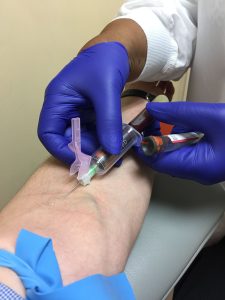
Brightly Red Colored Semi-Truck Speeding on a Two-Lane Highway with Cars in Background Under a Stunning Sunset in the American Southwest
You must be prepared for the Government continuing to say that all or most drugs coming through Mexico or Central America are bound by the United States. This is an overstatement, and the cartels are always changing up routes and tactics to avoid law enforcement. The Government will present a litany of evidence of Federal and foreign agents, cooperating witnesses and law enforcement experts on decoding alleged drug conversations to tie the drug shipment to the United States. But, if you can create a reasonable doubt that the drugs were just as likely to be bound for Europe or Asia than the United States, you could walk your client home. There is additional doubt that the drugs are to be consumed locally where they are found, but this is not likely enough to overcome the Government testimony by itself.
Look closely for how the testifying conspirators and others were paid. Were they paid in US Dollars or in pesos or other currency? What was the historical destination background of the conspiracy as presented? What can your investigator dig up regarding any relevant flight paths or ports of call related to boats and planes alleged to be used? Even if you don’t end up going to trial, such information can help you negotiate a much better agreement, perhaps even down to a telephone count or a misprision.
 Sherman & Plano, TX Criminal Defense Lawyer Blog
Sherman & Plano, TX Criminal Defense Lawyer Blog




 The Sherman and Plano Federal Courts are full of extradition cases from Latin America regarding drug smuggling. These individuals have often never set foot into the United States, so how can they be prosecuted here. Like the previous blog on airplane jurisdiction, the United States Congress has passed laws to make their global land jurisdiction as broad as possible. U.S.C. 959(c) states:
The Sherman and Plano Federal Courts are full of extradition cases from Latin America regarding drug smuggling. These individuals have often never set foot into the United States, so how can they be prosecuted here. Like the previous blog on airplane jurisdiction, the United States Congress has passed laws to make their global land jurisdiction as broad as possible. U.S.C. 959(c) states: In Morrison v. National Australia Bank, 561 U.S. 247 (2010), the Supreme Court applied the presumption against extraterritoriality to securities fraud statutes. Again in Kiobel v. Royal Dutch Petroleum, 133 S.Ct. 1659 (2013), the Supreme Court applied the presumption and held the plaintiff lacked extraterritorial jurisdiction under the Alien Tort Statute. In 2016, however, in RJR Nabisco, Inc. v. European Community, 136 S.Ct. 2090 (2016), the Court held the Racketeer Influenced and Corrupt Organizations Act (RICO) could apply extraterritorially. But the Court severely limited the application of RICO to foreign conduct that violates “a predicate statute that manifests an unmistakable congressional intent to apply extraterritorially.” Still, the Court held RICO’s private right of action does not overcome the presumption. Thus, the Supreme Court has revived the presumption against extraterritoriality and reinforced a high burden to overtake the canon to apply a law extraterritorially.
In Morrison v. National Australia Bank, 561 U.S. 247 (2010), the Supreme Court applied the presumption against extraterritoriality to securities fraud statutes. Again in Kiobel v. Royal Dutch Petroleum, 133 S.Ct. 1659 (2013), the Supreme Court applied the presumption and held the plaintiff lacked extraterritorial jurisdiction under the Alien Tort Statute. In 2016, however, in RJR Nabisco, Inc. v. European Community, 136 S.Ct. 2090 (2016), the Court held the Racketeer Influenced and Corrupt Organizations Act (RICO) could apply extraterritorially. But the Court severely limited the application of RICO to foreign conduct that violates “a predicate statute that manifests an unmistakable congressional intent to apply extraterritorially.” Still, the Court held RICO’s private right of action does not overcome the presumption. Thus, the Supreme Court has revived the presumption against extraterritoriality and reinforced a high burden to overtake the canon to apply a law extraterritorially. However, there is a “longstanding principle of American law that legislation of Congress, unless a contrary intent appears, is meant to apply only within the territorial jurisdiction of the United States.”
However, there is a “longstanding principle of American law that legislation of Congress, unless a contrary intent appears, is meant to apply only within the territorial jurisdiction of the United States.”  I was having a few flashbacks to civil procedure class in a recent Federal extradition case recently. In law school, we had to learn the International Shoe standard of “minimum contacts which do not disturb traditional notions of fair play and substantial justice” according to International Shoe, whereby a state in America obtains jurisdiction over a citizen of another American state. Like trial lawyers, the United States wants its jurisdiction to spread far and wide. It is a principal of Admiralty law that the United States has jurisdiction oceanwide. Congress has also passed several laws to extend Federal criminal law jurisdiction as broadly as possible around the world.
I was having a few flashbacks to civil procedure class in a recent Federal extradition case recently. In law school, we had to learn the International Shoe standard of “minimum contacts which do not disturb traditional notions of fair play and substantial justice” according to International Shoe, whereby a state in America obtains jurisdiction over a citizen of another American state. Like trial lawyers, the United States wants its jurisdiction to spread far and wide. It is a principal of Admiralty law that the United States has jurisdiction oceanwide. Congress has also passed several laws to extend Federal criminal law jurisdiction as broadly as possible around the world. However, Texas allows the admissibility of medical laboratory blood that is drawn and tested at hospitals using indirect enzyme tests to be admissible in a driving while intoxicated case. This is despite the fact that the testing is a much less reliable enzyme test through a chemical reaction that is not testing only ethanol quantitatively or forensically. Normally, only blood plasma is tested, not whole blood, even though the driving while intoxicated statute says whole blood. Thus, a conversion formula is used even though each person’s plasma ratio is different.
However, Texas allows the admissibility of medical laboratory blood that is drawn and tested at hospitals using indirect enzyme tests to be admissible in a driving while intoxicated case. This is despite the fact that the testing is a much less reliable enzyme test through a chemical reaction that is not testing only ethanol quantitatively or forensically. Normally, only blood plasma is tested, not whole blood, even though the driving while intoxicated statute says whole blood. Thus, a conversion formula is used even though each person’s plasma ratio is different. I saw a Nick Saban quote online that addresses that there are few choices in life when we want to succeed. There are not many ways to do things the right way, usually only one way works. Coach Saban said “[w]e have a younger generation that isn’t told no or told exactly how to do it. As a consequence, many young people have this illusion they can do what they want. The fact of the matter is that if you want to be good, you really don’t have a lot of choices. It takes what it takes. You have to do what you have to do to be successful.”
I saw a Nick Saban quote online that addresses that there are few choices in life when we want to succeed. There are not many ways to do things the right way, usually only one way works. Coach Saban said “[w]e have a younger generation that isn’t told no or told exactly how to do it. As a consequence, many young people have this illusion they can do what they want. The fact of the matter is that if you want to be good, you really don’t have a lot of choices. It takes what it takes. You have to do what you have to do to be successful.” But, a defendant like Dr. Kavanaugh might offer evidence of good character in general as a defense, which can be a defense in itself. United States Court of Appeals for the Fifth Circuit Pattern Jury Charge 1.09 explains that
But, a defendant like Dr. Kavanaugh might offer evidence of good character in general as a defense, which can be a defense in itself. United States Court of Appeals for the Fifth Circuit Pattern Jury Charge 1.09 explains that